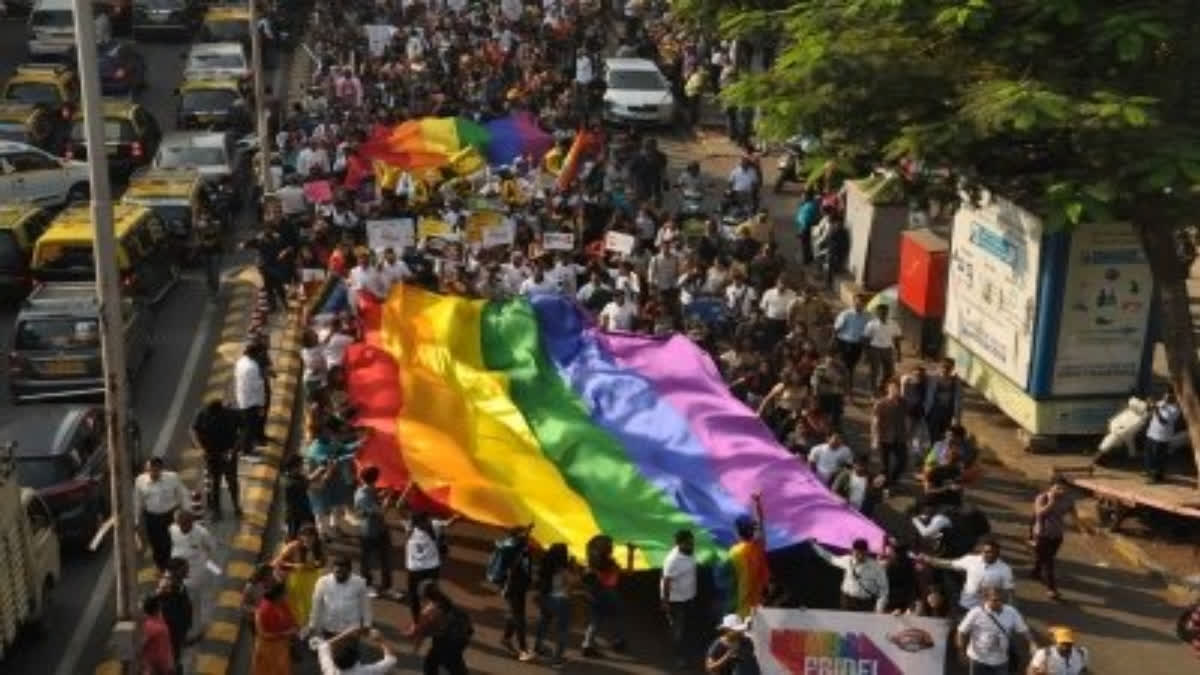New Delhi:Beginning hearing a batch of petitions seeking recognition of same-sex marriage, the Supreme Court on Tuesday made it clear that it will not go into the personal laws governing marriages while deciding on the pleas and asked the lawyers to advance arguments on the Special Marriage Act.
A five-judge constitution bench headed by Chief Justice D Y Chandrachud termed the issue involving the pleas complex and said the very notion of a man and a woman, as referred to in the Special Marriage Act, is not an absolute based on genitals".
"It is not a question of what your genitals are. It is far more complex, that's the point. So, even when the Special Marriage Act says man and woman, the very notion of a man and a woman is not an absolute based on genitals," said the bench, which also comprised justices Justices S K Kaul, S R Bhat, Hima Kohli and P S Narasimha.
The petitioners supporting same-sex marraige in the LGBTQ community argued that the centre has presented its clear stand before the top court saying that its an "urban elitist view" and leaving the matter to the Parliament would not bring in any change as Parliament represents the majority will or popular will and the LGBTQ community people are in minority and discriminated.
Senior Advocate Mukul Rohatgi appearing for one of the petitioners argued that the Constitution doesn't make any difference between heterosexual and homosexual people and it is wrong on part of the government to say that they are not equal. He argued that the argument that heterosexual majority is the only way of life, is the majoritarian view and discrimination based on sexual orientation is deeply offensive.
"I should not be discriminated against just because I am 10,000 and others are 10 crores," argued Rohatgi. He said that "marriage gives respectability in our society and in India settling in life involves getting married". "No 377, so live the way you want in your house but not outside else society will look at you in a different way. It's not to tell a constitutional court that if a man comes for his rights he should wait for the Parliament. I have right to come to the court because my rights are affected. I should not be told that I should wait for the Parliament and something will be done when I am old or dead," argued Rohatgi.
Interpreting Rohatgi, the CJI said that people can say that they have the right to privacy but then society can not say okay we will leave you alone but we will not recognise you. He said that humans are social animals, they can't be left alone and there is a positive obligation to the state. Rohatgi agreed and said that the same stigma continues, there is no criminalization but the majority perception is the same and still exists.
Senior Adv Maneka Guruswamy appearing for one of the petitioners and being herself a part of the LGBTQ community argued on the practical daily life issues that are faced by the people from the community. She said that she can't buy health insurance, open joint bank accounts etc because all that needs marriage as a pre-requisite.
"All rights flow from blood relations or marriage. That's the problem, if a relationship is short of marriage, we will have to keep coming to courts," argued Guruswamy.
Solicitor General Tushar Mehta, appearing for the Centre, referred to the laws on transgenders and said there are several rights such as the right to choose partners, privacy right, right to choose sexual orientation, and any discrimination is criminally prosecutable.
On being pointed out the difficulties and ramifications for the Hindu Marriage Act and personal laws of various religious groups if the apex court were to hold same-sex marriages valid, the bench said, "Then we can keep the personal laws out of the equation and all of you (lawyers) can address us on the Special Marriage Act (a religion-neutral marriage law)".
